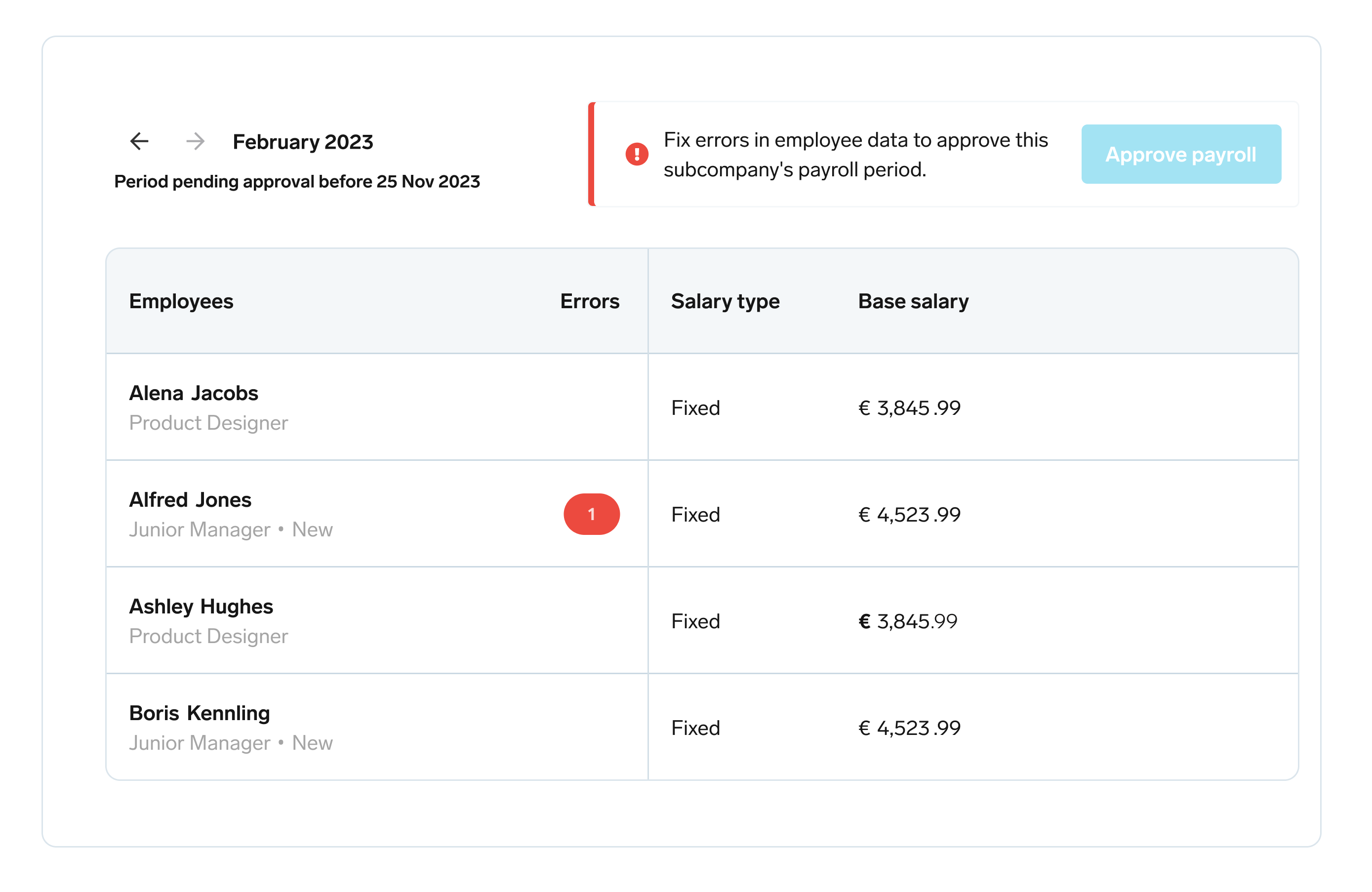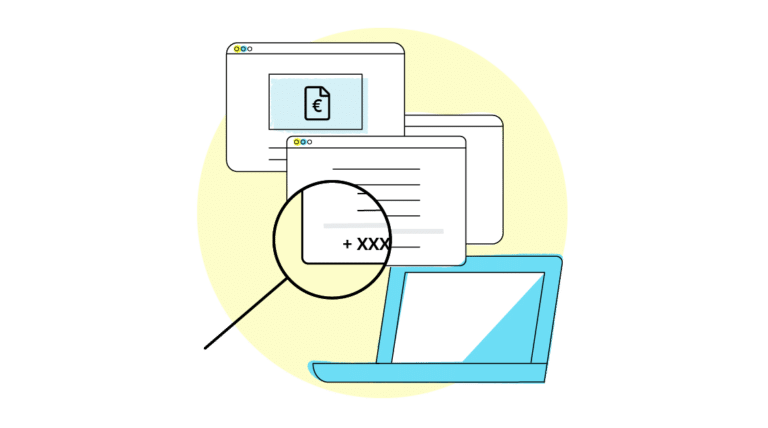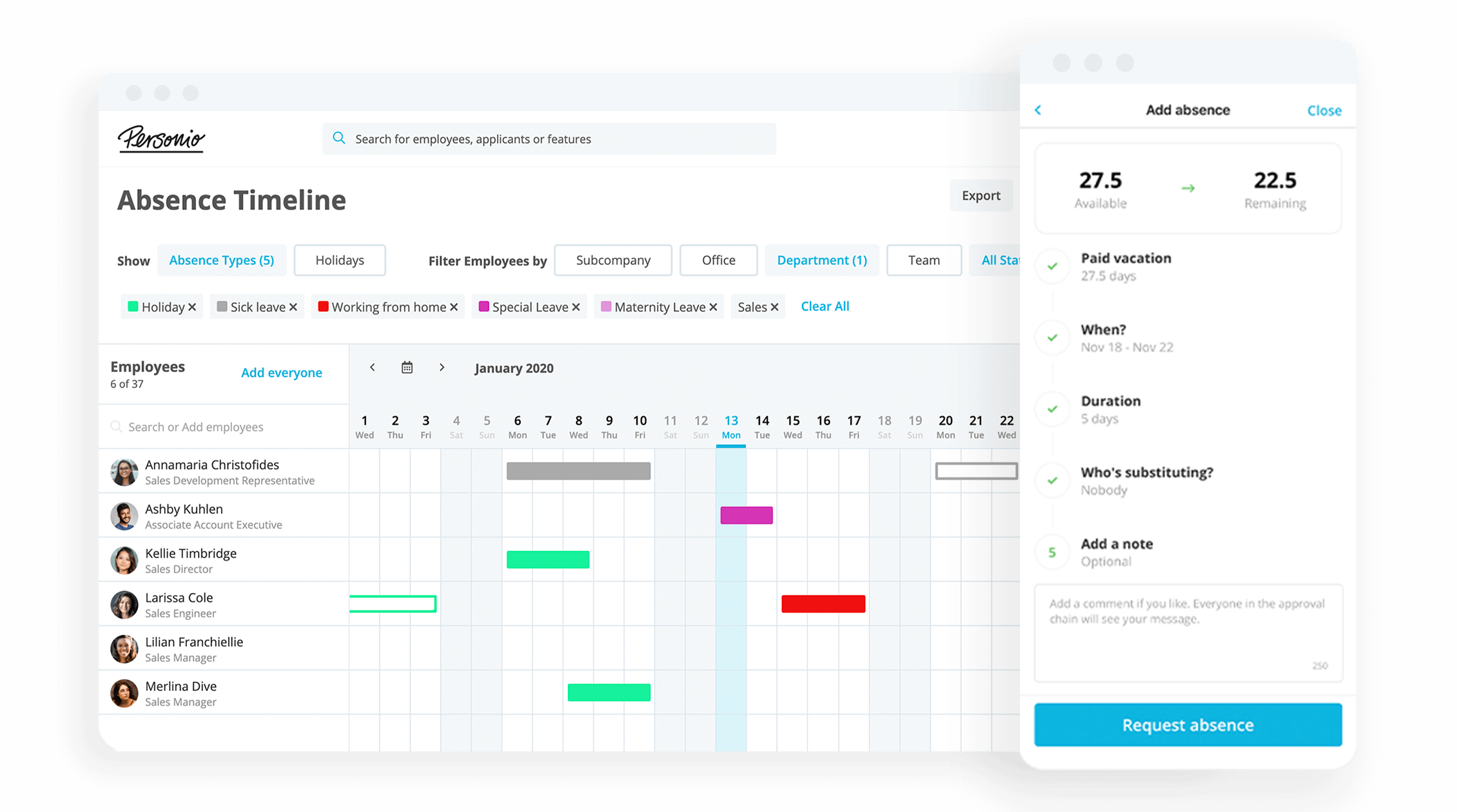
Integrate payroll with HR management
Integrate payroll processes seamlessly with Personio's comprehensive HR management platform.
Explore our productEmployee Final Pay When Leaving a Job in the UK

In this article, we’ll look at the final pay when an employee leaves a job in the UK and how it often differs from an employee’s regular wages. We’ll show you how and why it’s calculated differently, along with common mistakes to avoid.
Key Facts
An employee’s final pay includes holiday, sick and parental leave with any money they owe deducted.
Open communication is vital during a dispute on final pay to help ensure things don’t get heated.
Employees typically bring in third-party advocates before taking legal action if a dispute isn’t progressing.
Contents
- 1What Is Different About Employee’s Final Pay When Leaving a Job in the UK?
- 2What Employees Should Check for on Their Last Payslip
- 3Why You Should Communicate With Your Employee for Verification
- 4Common Issues You Might Find When Issuing Final Pay
- 5How To Settle Disputes Over Final Pay
- 6How Can Employers Calculate Final Pay When Workers Leave?
- 7FAQ
- 8Issuing the Correct Final Pay With Personio
What Is Different About Employee’s Final Pay When Leaving a Job in the UK?
An employee’s final pay is often different from the pay they’ve received in the past because they can claim additional payments beyond the norm. These extra entitlements often come from holiday pay, unused maternity leave, sick days, and others. Additionally, everything employees owe their employers is deducted from their last payslip, which further alters the amount of money they receive.
What Employees Should Check for on Their Last Payslip
If an employee wants to ensure they’re receiving all the money they’re owed, there are certain areas on their last payslip to double-check. Some of these areas include:
The number of hours worked
Any holiday pay owed
Any leftover maternity, paternity, adoption or parental leave pay
Any leftover sick pay
Overtime, commission or bonuses
Any notice or redundancy pay
Why You Should Communicate With Your Employee for Verification
Communication is vital while calculating an employee’s final pay. While the employer might have all the information needed to find what they owe an employee, things can slip through the cracks. When your worker is involved in the process from the beginning, they can help ensure everything is accurate while the HR representative answers any questions.
Reduce Your Administrative Tasks

Check employee absences company-wide in just one click with Personio’s powerful dashboards.
See Staff Availability With EaseCommon Issues You Might Find When Issuing Final Pay
Calculating all variables that can alter a final wage slip is a complex task prone to error. While it’s not guaranteed you’ll run into the mistakes below, recognising them when they happen can help you develop more efficient solutions.
Total Hours Worked
It’s possible that an employee isn’t getting paid for the number of hours they worked. This possible situation is why your business should keep careful records of each employee’s clock-in history and work rota confirmations. Double-checking the documented hours can often clear up any misunderstandings reasonably quickly.
Holiday Payments
Rolling holiday pay into an employee’s final paycheck is complicated because you’re not legally obligated to do so. However, payment in lieu of holiday leave is common in employee contracts.
If an employee is disputing its absence or accuracy, double-check the employee’s contract to see if they can receive holiday pay. Then check with the HR department to determine how many holidays they’ve taken within the last year and recalculate the money they’re owed.
Redundancy Pay
Employees are only entitled to redundancy pay if they’ve worked for your company for at least two years. If the amount isn’t what it’s supposed to be on their final payslip, it’s possible that someone miscalculated the amount of time they were employed. Additionally, the amount of redundancy pay is partially based on age:
Up to 22 years of age = half a week’s normal pay
Aged 22 to 40 = 1 week’s pay
Aged 41 and above = 1.5 weeks’ pay
It’s possible that a mistake in an employee’s personal information could have significantly altered the amount of money they were supposed to receive. However, this is all information your department would have on hand, so looking through an employee’s file to verify the information is a quick way to resolve this situation.
Sick Pay
Paying an employee’s remaining sick leave is a fairly easy process. Whatever of their allotted sick days they didn’t use, you put in their final paycheck. However, the situation becomes more complicated if the worker is sick during their notice period.
Does an employee still receive sick pay if they’re set to leave the company shortly? And are those sick days deducted from their final pay?
These are more complex questions than they seem, and many employees who experience issues with sick pay usually get someone to advocate for them to help resolve the situation.
Parental Leave
It’s possible that a mistake could have occurred due to being unaware of your company’s legal obligation to pay. For example, if an employee already planned parental leave prior to giving their notice, then your business needs to pay them until they’re no longer eligible for this benefit.
There may also be confusion on the leaving employee’s part because of any enhanced parental benefits you offer. While it’s illegal to deduct statutory parental leave from their final pay, that’s not the case for any extra you offer on top of that amount.
Employer Went Out of Business
If you’re scaling back or closing due to financial difficulties, this can make fulfilling your obligations towards your employees all the more difficult. In this situation, funds will be taken where they can, but if there aren’t enough, the UK government will offer a certain amount of assistance.
Dive Even Deeper Through Our People Strategy Guide

Gain insights directly from Personio's Chief People Officer on how to build a better people strategy roadmap today. Grab your copy, for free, right now.
Download For FreeHow To Settle Disputes Over Final Pay
Disputes over pay can become particularly heated due to the topic at hand, so handle them as quickly and amicably as possible.
The first resort is to sit down and discuss the issues. Try to find out where the problem lies and work collaboratively with the employee to see if you find a solution. Often these problems result from a simple misunderstanding and don’t escalate from there.
However, if the employee isn’t satisfied with the result of meeting with one of your HR representatives, then the issue could be taken up by a third party. Typically, it works its way to an Acas conciliator who will mediate the dispute, and if that doesn’t work, it will go to an employment tribunal for formal legal action.
How Can Employers Calculate Final Pay When Workers Leave?
How you calculate final pay can vary depending on the pay scheme the employees were on. First, you must determine how much they make daily:
Salary. Annual salary ÷ 52 (no. of weeks in a year) = weekly pay and weekly pay ÷ 5 (or no. of days in a working week) = daily pay
Monthly Rate. Monthly pay x 12 = annual pay, and then use the salary pay formulas to find daily pay
Bi-weekly Rate. Bi-weekly pay x 26 = annual salary, and then use the salary pay formulas to find daily pay
From there, you must multiply their daily pay by the number of days they worked within their final pay period. However, that is just their base salary, and there are multiple entitlements like holiday pay and parental leave to consider.
FAQ
How Much Is the Final Pay When Leaving a Job in the UK?
An employee’s final pay is the number of hours they worked within their final pay period plus all the monetary entitlements they have yet to collect, like sick pay and holiday pay.
What Happens With Pay When an Employee Leaves a Job?
A departing employee’s pay is calculated up to the last day they worked, with any extra entitlements and deductions affecting how much they get in the end.
Issuing the Correct Final Pay With Personio
Getting an employee’s final pay correctly takes much more effort than giving their regular salary. While it’s possible to calculate by hand, mistakes become more likely and could eventually lead to expensive legal action.
Using Personio’s preliminary payroll features, all relevant salary information is kept in one place, so your HR representatives don’t have to search for entitlements. Book your free demo to learn how Personio can help you exceptionally manage your entire workforce.
Disclaimer
We would like to inform you that the contents of our website (including any legal contributions) are for non-binding informational purposes only and does not in any way constitute legal advice. The content of this information cannot and is not intended to replace individual and binding legal advice from e.g. a lawyer that addresses your specific situation. In this respect, all information provided is without guarantee of correctness, completeness and up-to-dateness.
